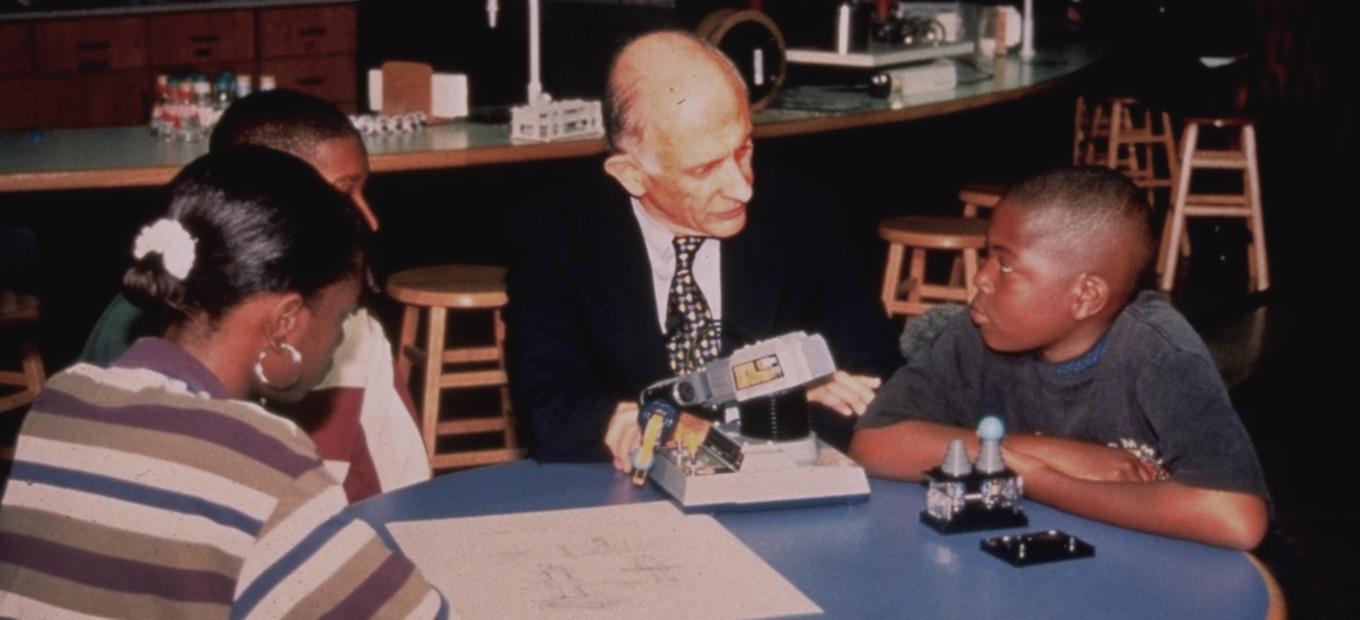Smithsonian Welcomes Papers of the Late Jerome H. Lemelson

Lemelson believed that education was key to helping the US regain its place at the top of innovation and creativity in the world. In 1993, he and his wife Dorothy started the Lemelson Foundation to support educational initiatives to attract young people to science and invention. © Smithsonian Institution
The Smithsonian’s National Museum of American History has accepted the donation of the papers of the late inventor Jerome H. Lemelson, a gift from the Dorothy Lemelson Trust. The Jerome H. Lemelson Papers, spanning 1943–2003, consist of 363 cubic feet of papers documenting Lemelson’s inventions, his creative process, the patent process and the legal process by which he secured his rights. Lemelson’s patents cover a wide range of topics—toys, medicine and technology. In addition to documenting Lemelson’s inventions, the papers also document his work defending the rights of independent inventors by working to reform patent law and the legal system. The collection includes invention notebooks, patents, patent applications, correspondence, subject reference files, licensing agreements, patent litigation files, newspaper clippings, sketches, ephemera and audio-visual materials.
The invention notebooks form the core of the collection, providing detailed descriptions of possible new inventions and ideas spanning 46 years. Lemelson’s notebooks contain notes about meetings with colleagues, variations on patent ideas, outlines of patent specifications and related sketches. Notebook entries are often dated and signed by Lemelson and witnesses to whom he disclosed his ideas. The notebooks present a comprehensive overview of his ideas and are significant to understanding his creative process and how his ideas changed or did not change over time.
“We are deeply honored to receive the Jerome H. Lemelson Papers, a collection that encapsulates the boundless creativity and ingenuity of one of America's most prolific inventors,” said Anthea M. Hartig, the museum’s Elizabeth MacMillian Director. “This archive not only documents the vast range of Lemelson's inventions but also provides invaluable insights into the innovative spirit that has driven technological progress over the decades. By preserving and sharing these materials, we continue our mission to inspire future generations of inventors and innovators.”
Lemelson was one of the most prolific American inventors of all time, and in the sheer range of his ideas—from cutting-edge medical and industrial technologies to novelties, gadgets and toys—undoubtedly one of the most versatile. Lemelson holds 606 patents documenting a wide range of inventions, from toys to “machine visioning.” The portfolio of products covered by his patents is voluminous, including, for example, components in the Walkman, the VCR, the fax machine and the camcorder. His background in aeronautical and industrial engineering served him well, allowing him to understand increasingly complex technologies, to see their potential and to exploit them. For example, Lemelson’s machine visioning involved a camera to inspect items on an assembly line, compare them with a digital image stored in its memory and determine whether they are defective. He designed computer-controlled machine tools used in automated, flexible manufacturing systems that let an assembly line produce different products at the same time. The audio-cassette mechanism he developed and licensed to Sony became a standard part of cassette players.
The Jerome H. Lemelson Papers join a significant body of archival collections that document independent inventors that include the Earl S. Tupper Papers, Charlotte Cramer Sachs Papers, the Brannock Device Company Records, the Marion O’Brien Donovan Papers, the Patricia Bath Papers and the Robert W. Kearns Papers, to name a few. The collection is available for research in the Archives Center.
About the Lemelson Center
The Smithsonian’s Lemelson Center engages, educates and empowers the public to participate in technological, economic and social change. The center undertakes historical research, develops educational initiatives, creates exhibitions and hosts public programming to advance new perspectives on invention and innovation and to foster interactions between the public and inventors. The Lemelson Hall of Invention and Innovation, featuring the Draper Spark!Lab and “Change Your Game”/“Cambia tu juego,” is a signature part of the National Museum of American History’s 45,000-square-foot space centered on the theme of innovation. For more information, visit the center’s website. For Smithsonian information, the public may call (202) 633-1000.
About The Lemelson Foundation
The Lemelson Foundation was established by Jerome and Dorothy Lemelson in 1992 with the vision of cultivating future generations of inventors to create a better world. The foundation focuses on nurturing invention-based businesses that are developing unique, physical products to address global and community challenges and are destined for high growth. After more than 30 years of giving, the foundation continues to be led by the Lemelson family. To date, they have provided more than $350 million in support of our mission.
About the National Museum of American History
Through incomparable collections, rigorous research and dynamic public outreach, the National Museum of American History seeks to empower people to create a more just and compassionate future by examining, preserving and sharing the complexity of our past. The museum, located on Constitution Avenue N.W., between 12th and 14th streets, is open Friday through Tuesday between 10 a.m. and 5:30 p.m. Admission is free, and passes are not required. The doors of the museum are always open online and the virtual museum continues to expand its offerings, including online exhibitions, K–12 educational materials and programs. The public can follow the museum on social media on Twitter, Instagram and Facebook. For more information, visit the museum’s website. For Smithsonian information, the public may call (202) 633-1000.
# # #
SI-302-2024
Laura Havel
Melinda Machado
202-633-3129
Vanessa Briseño
(503) 827-8910
vanessab@lemelson.org
